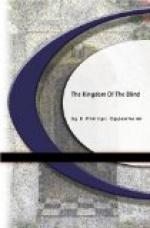“Good morning, Thomson!” he said brusquely. “Sit down, please. Leave the room, Dawkes, and close the door. Thanks! Thomson, what about this request of yours?”
“I felt bound to bring the matter before you, sir,” Thomson replied. “I made my application to the censor and you know the result.”
The Chief swung round in his chair.
“Look here,” he said, “the censor’s department has instructions to afford you every possible assistance in any researches you make. There are just twenty-four names in the United Kingdom which have been admitted to the privileges of free correspondence. The censor has no right to touch any letters addressed to them. Sir Alfred Anselman is upon that list.”
Thomson nodded gravely.
“So I have been given to understand,” he remarked.
The Chief leaned back in his chair. His cold grey eyes were studying the other’s face.
“Thomson,” he continued, “I know that you are not a sensationalist. At the same time, this request of yours is a little nerve-shattering, isn’t it? Sir Alfred Anselman has been the Chancellor’s right-hand man. It was mainly owing to his efforts that the war loan was such a success. He has done more for us in the city than any other Englishman. He has given large sums to the various war funds, his nephew is a very distinguished young officer. Now there suddenly comes a request from you to have the censor pass you copies of all his Dutch correspondence. There’d be the very devil to pay if I consented.”
Thomson cleared his throat for a moment.
“Sir,” he said, “you and I have discussed this matter indirectly more than once. You are not yet of my opinion but you will be. The halfpenny Press has sickened us so with the subject of spies that the man who groans about espionage to-day is avoided like a pestilence. Yet it is my impression that there is in London, undetected and unsuspected, a marvellous system of German espionage, a company of men who have sold themselves to the enemy, whose names we should have considered above reproach. It is my job to sift this matter to the bottom. I can only do so if you will give me supreme power over the censorship.”
“Look here, Thomson,” the Chief demanded, “you don’t suspect Sir Alfred Anselman?”
“I do, sir!”
The Chief was obviously dumbfounded. He sat, for a few moments, thinking.
“You’re a sane man, too, Thomson,” he muttered, “but it’s the most astounding charge I’ve ever heard.”
“It’s the most astounding conspiracy,” Thomson replied. “I was in Germany a few weeks ago, as you know.”
“I heard all about it. A very brilliant but a very dangerous exploit, that of yours, Thomson.”




